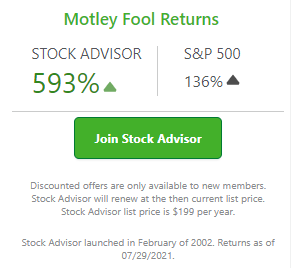Sojourner
Thinks s/he gets paid by the post
- Joined
- Jan 8, 2012
- Messages
- 2,603
I clicked on a link that took me to an article on Motley Fool just a few minutes ago, and in the margin I saw an ad for something called the Motley Fool Stock Advisor. This is what they are claiming:
Motley Fool Advisor: Up 593%
S&P 500: Up 136%
In the small print, they imply that this is over the period Feb 2002 - July 2021. Yet, a quick back-test using Portfolio Visualizer shows that the S&P has more than quintupled (actually about 5.5x) since Feb 2002, which means it has grown by 450%. But even discounting that, it appears that they are claiming that their Advisor has been roughly 4.3x (i.e., 593 divided by 136) as profitable for investors since Feb 2002. Some snake oil, anyone?
Now here's the real kicker. They show a chart comparing the "time-weighted return" of the Advisor vs. the S&P 500 for a $10k starting investment. The growth of the S&P is fairly accurately shown as going from $10k to around $50k. But the Advisor is shown as going from $10k to over $325k! That's a 3,150% increase, equivalent to roughly 20% compound annual growth!! Over that period, the S&P 500 achieved "only" a 9.2% CAG.
I'm not sure what my question is here, other than maybe: Is there any (realistic) way this could be true, and if not, how can they get away with such blatantly misleading—or downright false—advertising? I mean, it's one thing to post an ad about, say, the metaphysical healing powers of crystals (hard to prove or disprove), but it's another whole level of deception to claim you have a stock advisor service that has outperformed the S&P by such a large margin for two whole decades!
Motley Fool Advisor: Up 593%
S&P 500: Up 136%
In the small print, they imply that this is over the period Feb 2002 - July 2021. Yet, a quick back-test using Portfolio Visualizer shows that the S&P has more than quintupled (actually about 5.5x) since Feb 2002, which means it has grown by 450%. But even discounting that, it appears that they are claiming that their Advisor has been roughly 4.3x (i.e., 593 divided by 136) as profitable for investors since Feb 2002. Some snake oil, anyone?
Now here's the real kicker. They show a chart comparing the "time-weighted return" of the Advisor vs. the S&P 500 for a $10k starting investment. The growth of the S&P is fairly accurately shown as going from $10k to around $50k. But the Advisor is shown as going from $10k to over $325k! That's a 3,150% increase, equivalent to roughly 20% compound annual growth!! Over that period, the S&P 500 achieved "only" a 9.2% CAG.
I'm not sure what my question is here, other than maybe: Is there any (realistic) way this could be true, and if not, how can they get away with such blatantly misleading—or downright false—advertising? I mean, it's one thing to post an ad about, say, the metaphysical healing powers of crystals (hard to prove or disprove), but it's another whole level of deception to claim you have a stock advisor service that has outperformed the S&P by such a large margin for two whole decades!

